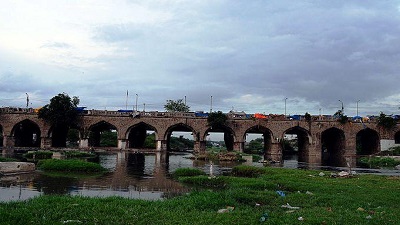Category : Water Pollution | Location : Telangana | Posted on 2021-08-08 23:54:42

HYDERABAD: River Musi has once again earned the dubious distinction of being named among the ‘34 most polluted river stretches’.
In a recent reply to Parliament, minister for jal shakti, G.S. Shekhawat, said that industrial units are required to install effluent treatment plants (ETPs) and treat their effluents in compliance with the stipulated environmental standards before discharging into river and water bodies.
However, nothing could be farther from the truth, rue residents of Edulabad, which bears the brunt of pollution owing to its proximity.
“Every year, these officials pull off an elaborate stunt. Before the arrival of officials for inspection, including from National Green Tribunal (NGT), the industries shut off their discharge into the river and collect clean samples. But, we have to live with the pollution day in and day out,” B Shankar, a resident of Edulabad, told Deccan Chronicle.
While the Central Pollution Control Board (CPCB), and Telangana State Pollution Control Board (TSPCBs) are expected to monitor industries with respect to effluent discharge standards and take action for non-compliance, it is a farce, say residents.
“The fact that Musi is polluted is repeated in every parliament session, then why is there no action? Don’t we have the right to live a dignified life?” questioned, A Sudhakar, another local.
‘Cleaning and rejuvenation of rivers is an ongoing activity. It is the responsibility of the states/UTs and local bodies to ensure required treatment of sewage and industrial effluents to the prescribed norms before discharging into river and other water bodies, coastal waters or land to prevent and control of pollution therein,’ the minister said in his reply.
The Telangana government has been maintaining that Musi would be developed on the lines of any other major river and has even set aside a budget of Rs 2,500 crore for the purpose. The river begins from the Ananthagiri Hills in Vikarabad and meets Krishna River in Nalgonda.
The Musi watershed covers an approximate area of 10,858 square kilometres. Based on the growth in population in the Musi watershed area over the last five decades, the total sewage generation is estimated to be around 1,625 million litres per day (MLD) by 2029. The present sewage treatment capacity is 725.8 MLD, said an official from TSPCB.
Apart from Musi the other rivers from Telangana that feature in the list with polluted stretches are Manjeera, Nakkavagu, Karakavagu, Maner, Godavari, Kinnersani and Krishna.
Source: https://www.deccanchronicle.com/lifestyle/environment/080821/musi-remains-among-the-most-polluted-river-stretches.html